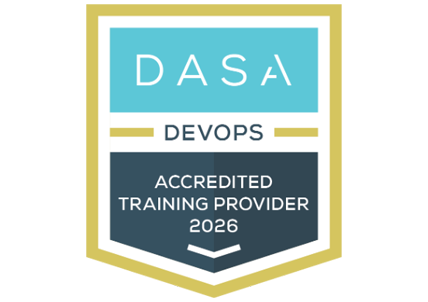Unable to find what you're searching for?
We're here to help you find itDASA DevOps Professional: Enable and Scale Course Overview
The DASA DevOps Professional: Enable and Scale course is designed to educate learners on how to effectively enable and scale DevOps practices within their organization. The comprehensive curriculum spans 16 modules, starting with designing and building effective DevOps teams, instilling proper governance, and fostering a culture that supports DevOps principles. It emphasizes the importance of creating purpose, exercising servant leadership, and focusing on success through customer value.
Learners will develop an understanding of stakeholder management, the synergy between Lean Startup and DevOps, and the power of story mapping in product development. The course also covers building optimal workflow, understanding different types of continuous improvement, and utilizing various tools like Kaizen and Value Stream Mapping to improve processes.
By the end of the course, participants will be equipped with the skills to drive high performance in teams, maintain agility, and promote a culture of innovation and courage, which are essential for successful DevOps transformation. This training is pivotal for professionals aiming to scale DevOps practices and enhance collaboration and efficiency in their IT and service delivery environments.
Purchase This Course
USD
View Fees Breakdown
| Flexi Video | 16,449 |
| Official E-coursebook | |
| Exam Voucher (optional) | |
| Hands-On-Labs2 | 4,159 |
| + GST 18% | 4,259 |
|
Total Fees (without exam & Labs) |
22,359 (INR) |
|
Total Fees (with Labs) |
28,359 (INR) |
Select Time
Select Date
| Day | Time |
|---|---|
|
to
|
to |
Scroll to view more course dates
*Inclusions in Koenig's Learning Stack may vary as per policies of OEMs
Suggestion submitted successfully.
Koenig Learning Stack
Inclusions in Koenig's Learning Stack may vary as per policies of OEMs



